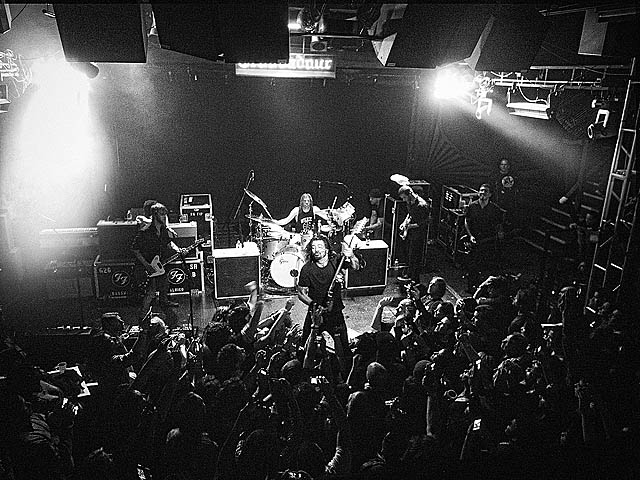hey, i have one of those!!
Does having professional equipment make you a professional? If you are a professional (ie. making a living from your profession), what kind of threat does an influx of new technologies and talent have on the existing order? And what pitfalls exist in those chaotic periods of influx?
With the introduction of cameras like the Canon 5D Mk 3 or the Nikon D800, professional level cameras have reached “affordable†levels. It may still be $3k to pick up a bare bones version, but that’s a far cry from spending $60k on an IQ180 digital back.
Although affordability is generally good, some professional photographers don’t like the hobbyist photographer proclaiming, “Hey, that’s what I shoot with, too.†It rarely happens when you’re using a $60k camera. It pro’ly doesn’t happen to neurosurgeons much, either – “Hey, that’s the same Stryker Saw I have at home!â€
While photographers may complain that now everyone who has a 5D3 or D800 thinks they’re a professional photographer, writers have always had to deal with this challenge. Writing doesn’t have a big “cost barrier†to entry, so I’m sure people were like, “Hey Shakespeare – look at this new quill I bought and all this ink. I bet I have enough ink for like 100 sonnets here!â€
The democratization of media is a modern innovation (although it pro’ly started with the printing press), but it does have its downsides. Before ePublishing, you had to convince a real publisher that your book was worthy of being printed and distributed (and maybe promoted if you were lucky). Many worthwhile books got passed over, and people without the right connections might have been overlooked. But that barrier also served to maintain a certain quality level.
When I was a kid, I had to hunt through the shelves at my local bookstores to try to find book 3 of a series where I’d already read books 1,2 and 4. Now I can just blaze through them in order on my Kindle. However, when I’m looking for a new book on Amazon, there are tons of eBooks that are, to use the technical term for it, atrocious. So I find myself doing the electronic equivalent of hunting through bookshelves – but instead of looking for specific authors, I’m trying to find the diamonds in the increasingly rough landscape. Sites like GoodReads have helped to simplify the process a bit, but it’s still quite challenging.
Authors who are already established or have some cultural prominence are, counterintuitively, the ones who benefit most from this democratization. They are no longer at the mercy of big publishers, bookstores, etc. The people who haven’t breached those old world barriers are usually the ones that are least able to benefit. Before, you might have to convince one publisher or agent that your book was worthwhile. Now, you have to convince 100,000 readers to buy that book – you have to be author and marketer. Promotion is not as simple as “good worth of mouth†– if it were, studios wouldn’t spend $40 million promoting movies that will be accessible at every multiplex in the country anyways. (Although that skips part of the formula – those multiplexes wouldn’t have that many showings if the studio hadn’t guaranteed a big media buy).
If you are author and marketer, then you may start to do what publishers and studios and other corporations do – create your own fake word of mouth. Look at the case of John Locke and others, who created hundreds of fake Amazon reviews in order to promote their own work. Brilliant? Maybe not. Effective? Definitely. Yet if you are just a “good writer”, you are now competing not only against other good writers, but people who may be much better marketers, advertisers, fake promoters, etc. The authenticity of what you’re viewing is always to be questioned – whether it’s on Amazon, Instagram or the 6pm news. Everyone is evolving with the shifts in culture and technology, and not all that evolution is beneficial.
In any event, like most things that “simplify†our life, these innovations come with their own new complexities. Email and cell phones were invented as devices of convenience, efficiency and time-saving. Yet how much of our day is spent on these “time-saving†innovations? I’m not sure, but I’m going to check my new time-boxing app to figure out how much time I spend on email and cell phones, then I’ll put it into Google Docs and make a pie chart, then with all the time I’ve saved, I’ll look at some webcams of beaches.
I sometimes shoot live music for a Japanese magazine called Rockin’ On. Pretty much any project for them is fun because of the people involved. When they do a story on a band, they’ll devote eight pages to photographs and another eight pages to carefully translated questions about a band’s career trajectory and the underpinnings of their lyrical message. It’s not only interesting to their Japanese readers, but makes Western bands wrestle with questions English language journalists rarely get the space to ask (unless you’re reading Chuck Klosterman books, which I highly recommend).
So I shot portraits of Dave Grohl for the cover and the whole Foo Fighters band for the inside story. And although they wouldn’t announce it until the last moment, they were going to play the Troubador in about eight hours. For a band that plays to 20,000 fans, it’s rare to see them in a 200 person club.
I showed up at the Troubador and stuck a big Foo Fighters WORKING label on my shirt to discourage the idea that I might be also having fun (and to make sure security wouldn’t tackle me). I wandered through the crowd, climbed onto both sides of the stage, perched up on the catwalks, and watched the fire marshall high five a drunk girl while they listened to Dave sing My Hero.
The next day, portraits of Dave for the cover were first on the editing block. Most of my photography tends to focus on human connection and intimacy, and looking for a real connection in photos can be challenging when you have a short time to develop a rapport. Then I switched to the live shots. The thumbnail images showed an intimate venue with ecstatic fans reaching toward a larger than life singer. An enlargement revealed a different story, however. All those ecstatic fans reaching desperately toward someone they normally only see on TV or playing a stadium…actually had iPhones and Blackberries in their hands. No one was looking at the Foo Fighters performing six feet in front of them – instead they were looking at them play on a 3 inch video screen.
Of course I was doing the same thing, but I was there working and while I love my job, I do take it seriously. I wasn’t posting a Facebook photo just to prove I was there, I was trying to capture the energy of the event for tens of thousands of Japanese Foo Fighters fans who would never see Los Angeles, let alone the Troubador.
I’m not sure how I feel about this. Facebook and Twitter encourage people to share and I’ve spoken to friends who feel more motivated to do things solely because of their ability to share their experiences. At the same time, doesn’t this detract from the actual “experiencing” it part? Facebook and Twitter also detract from people’s verbal and written abilities – overall they are more visual outlets. I would like to read someone write about how they felt watching Foo Fighters perform (in more than 140 characters), rather than look at a blurry and noisy picture where I’d have to read to caption to even know what’s going on.
Maybe this is just part of digital life in 2011, but it’s such an example of carefully captured disconnection. We preserve so many of life’s little moments, yet we live them less fully.
As always, Louis CK sums it up quite well.
What will people remember you for?
Everyone (except my friend Troy House who avoids basketball like the plague) has probably heard the “greatest basketball player” discussion. Michael Jordan, Kobe Bryant, LeBron James, Wilt Chamberlin, etc. Is it based on pure shooting ability (Kobe?). Is it based on team importance (LeBron?). Is it based on championship rings (Bill Russell?).
You can argue the relative merits of any of those positions. The same thing happens in any competitive field. Who’s the best director in Hollywood? What’s the best burger spot in New York? Who’s the best dentist or car mechanic? People use all sorts of metrics. Cheapest car mechanic, highest grossing director, the director with the most awards, etc.
I find it’s nice to turn to sports, as it often paints a clearer picture. Hence all the wonderful metaphors in the sports world. A team’s winning or losing has to do with many factors, but in the end they either win or lose. In Hollywood, one person’s most hated movie will be another person’s favorite.
Getting back to basketball, however, all the same confusion applies with this discussion. People usually just tend to pick the most public figure who was playing when they were about 10-15 years old. Same way people often pick sports teams for life, someone who is about 22 now might automatically think Kobe Bryant is the best player, more because of timing than sheer ability. If you’re 12 now, in 10 years you will write blog entries about LeBron being the greatest player.
However, I think people often come back to Michael Jordan for a number of reasons – and for more than just being a great player.
Michael Jordan put his imprint on everything he did. He didn’t just win, he did it with style. He looked like he was simultaneously working harder than everyone else, playing with less effort and having way more fun. While other players might beat you, Jordan would make you look bad, but without ever making you look bad. I saw players actually fall down from Jordan’s feinting stutter steps – not because of anything he did, but because they were already scared and anticipating what he was going to do.
People talk about a “mental” game, but they don’t realize that it’s not just in your head, but in everyone else’s head, too.
When it comes down to it, no one had more signature “moves” than Jordan. Kobe has a distinctive fadeaway, and Kareem had a distinctive hook – but everything Jordan did was distinctive. Things that had nothing to do with even playing were distinctive! The way he chewed gum, or stuck his tongue out when driving the lane. What other player put such a stamp on themselves, and on the game?
It’s no surprise that the most distinctive player in basketball history practically branded Nike during the 90’s with just the afterglow of his own personal branding.
Nothing Jordan did was a gimmick, though. He didn’t stick his tongue out to distract you from the fact that he couldn’t drive to the basket. This is a huge distinction, and one that people forget. If you develop a way of doing things because your way is better and reflects your personality – that’s a signature. If you develop a way of doing things that hides the fact that your way isn’t better and only reflects your desired image – that’s a gimmick.
Jordan really did change the game.




